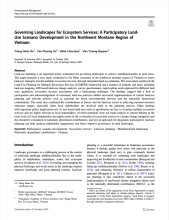Land Library Search
Through our robust search engine, you can search for any item of the over 73,000 highly curated resources in the Land Library.
If you would like to find an overview of what is possible, feel free to peruse the Search Guide.
/ library resources
Showing items 1 through 9 of 79.L’actualité de cet automne s’annonce exceptionnellement chargée sur les questions environnementales : les trois COP issues du Sommet de la Terre vont se réunir à quelques semaines d’intervalle, en commençant par la COP Biodiversité.
Les chiffres présentés dans la nouvelle publication sur la sécheresse en disent long sur l’urgence de s’attaquer à ce problème pressant. Pour lutter contre les effets négatifs de la sécheresse, la résilience mondiale à la sécheresse n’est pas une question de choix mais une nécessité.
The Global Programme “Responsible Land Policy” (GPRLP) is part of the BMZ Special Initiative "Transformation of Agricultural and Food Systems" which aims to reduce extreme poverty and hunger. The GPRLP is implemented by GIZ and has nine country components.
These guidelines support GEF project developers in formulating projects that contribute to the LDN ambitions of countries and in ensuring that other projects not directly targeting LDN are compatible with LDN objectives and approaches.
Land-use planning is an important policy instrument for governing landscapes to achieve multifunctionality in rural areas.
In the effort to achieve the Sustainable Development Goals (SDGs) related to food, health, water, and climate, an increase in pressure on land is highly likely.
Burundi’s economy is dominated by small-scale agriculture practiced on the slopes of hills and mountains. The burgeoning population and an overwhelming reliance on natural resources by 90 percent of the population have both caused aggravated environmental degradation.
The five Central Asian countries (Kazakhstan, Kyrgyz Republic, Tajikistan, Turkmenistan, and Uzbekistan) are among the Europe and Central Asia Region’s most vulnerable to climate change; building resilience is thus a priority for poverty reduction and shared prosperity in Central Asia.
This project aims to improve sustainable natural resource management and promote livelihood diversification in selected Tunisian oases.








